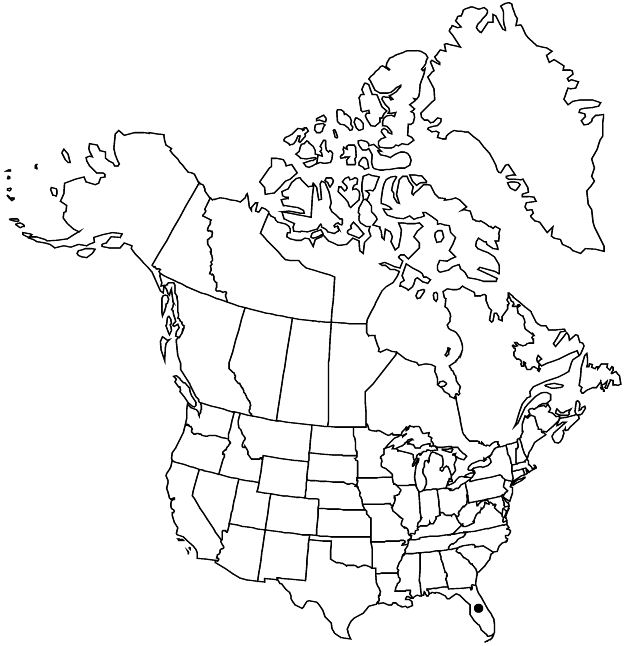Difference between revisions of "Cayaponia americana"
in A. L. P. P. de Candolle and C. de Candolle, Monogr. Phan. 3: 785. 1881.
FNA>Volume Importer |
imported>Volume Importer |
||
| (6 intermediate revisions by 2 users not shown) | |||
| Line 1: | Line 1: | ||
{{Treatment/ID | {{Treatment/ID | ||
|accepted_name=Cayaponia americana | |accepted_name=Cayaponia americana | ||
| − | |accepted_authority=(Plumier ex Lamarck) Cogniaux | + | |accepted_authority=(Plumier ex Lamarck) Cogniaux |
|publications={{Treatment/Publication | |publications={{Treatment/Publication | ||
|title=in A. L. P. P. de Candolle and C. de Candolle, Monogr. Phan. | |title=in A. L. P. P. de Candolle and C. de Candolle, Monogr. Phan. | ||
| Line 8: | Line 8: | ||
}} | }} | ||
|common_names=American melonleaf | |common_names=American melonleaf | ||
| − | |basionyms={{Treatment/ID/ | + | |basionyms={{Treatment/ID/Basionym |
|name=Bryonia americana | |name=Bryonia americana | ||
|authority=Plumier ex Lamarck | |authority=Plumier ex Lamarck | ||
| + | |rank=species | ||
| + | |publication_title=in J. Lamarck et al., Encycl. | ||
| + | |publication_place=1: 498. 1785 | ||
}} | }} | ||
|synonyms={{Treatment/ID/Synonym | |synonyms={{Treatment/ID/Synonym | ||
|name=Cayaponia americana var. angustiloba | |name=Cayaponia americana var. angustiloba | ||
|authority=Cogniaux | |authority=Cogniaux | ||
| − | }}{{Treatment/ID/Synonym | + | |rank=variety |
| + | }} {{Treatment/ID/Synonym | ||
|name=C. americana var. subintegrifolia | |name=C. americana var. subintegrifolia | ||
|authority=Cogniaux | |authority=Cogniaux | ||
| + | |rank=variety | ||
}} | }} | ||
|hierarchy=Cucurbitaceae;Cayaponia;Cayaponia americana | |hierarchy=Cucurbitaceae;Cayaponia;Cayaponia americana | ||
| Line 33: | Line 38: | ||
|elevation=0–20 m | |elevation=0–20 m | ||
|distribution=Fla.;West Indies. | |distribution=Fla.;West Indies. | ||
| − | |discussion=<p>Cayaponia americana is known in the flora area only from Miami-Dade County. The leaf blades are darker and thicker than those of C. quinqueloba, and peduncle length is greater in C. americana.</p> | + | |discussion=<p><i>Cayaponia americana</i> is known in the flora area only from Miami-Dade County. The leaf blades are darker and thicker than those of <i>C. quinqueloba</i>, and peduncle length is greater in <i>C. americana</i>.</p> |
|tables= | |tables= | ||
|references= | |references= | ||
| Line 42: | Line 47: | ||
-->{{#Taxon: | -->{{#Taxon: | ||
name=Cayaponia americana | name=Cayaponia americana | ||
| − | + | |authority=(Plumier ex Lamarck) Cogniaux | |
| − | |authority=(Plumier ex Lamarck) Cogniaux | ||
|rank=species | |rank=species | ||
|parent rank=genus | |parent rank=genus | ||
| Line 57: | Line 61: | ||
|publication year=1881 | |publication year=1881 | ||
|special status= | |special status= | ||
| − | |source xml=https:// | + | |source xml=https://bitbucket.org/aafc-mbb/fna-data-curation/src/2e0870ddd59836b60bcf96646a41e87ea5a5943a/coarse_grained_fna_xml/V6/V6_77.xml |
|genus=Cayaponia | |genus=Cayaponia | ||
|species=Cayaponia americana | |species=Cayaponia americana | ||
Latest revision as of 22:23, 5 November 2020
Vines herbaceous. Stems sulcate, glabrous; tendrils unbranched. Leaves: petiole 1–5 cm, glabrous; blade ovate to deltate or pentagonal, unlobed or shallowly to deeply 3–5-lobed, 5–14 × 5–13 cm, terminal lobe oblong-lanceolate, broadest at base, lateral lobes often sublobed, base cordate to truncate or rounded, margins remotely serrulate or denticulate, surfaces hirsute-hispidulous abaxially (not white-sericeous), pustulate-scabrous adaxially. Flowers: sepals deltate to triangular, 1–2 mm; petals pale green to whitish, corolla 6–10 mm; pistillate flowers solitary, axillary, or 3–5 on short racemoid branches, staminate flowers solitary, axillary. Fruits usually 1, axillary, or 3–5 on racemoid branches, orange to golden brown, short ellipsoid-cylindric, 1.5–2 cm; peduncle 8–15(–30) mm. Seeds usually 3, 10 mm.
Phenology: Flowering May–Aug.
Habitat: Rockland hammocks, hammock edges and clearings
Elevation: 0–20 m
Distribution

Fla., West Indies.
Discussion
Cayaponia americana is known in the flora area only from Miami-Dade County. The leaf blades are darker and thicker than those of C. quinqueloba, and peduncle length is greater in C. americana.
Selected References
None.